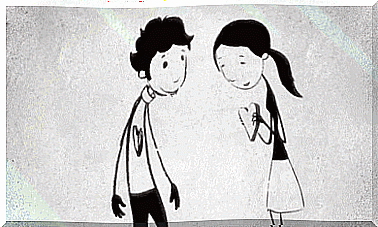Do You Know What Are The Most Common Cognitive Distortions In Couples?

Cognitive distortions are rigid and erroneous thought patterns that our mind uses during the information process. They select the information discussed, the way it is processed and the results, in the form of thoughts and emotions, of this process.
There are different types of cognitive distortions and all people experience them at some point in their life. If the distortions appear occasionally, they are not a problem. On the other hand, if they appear frequently, they generate problems in interpersonal relationships as well as psychological discomfort and constitute a brake on personal development.
In couples, it is usual that cognitive distortions also leave a mark. If they manage to dominate thoughts related to cohabitation, love or quarrels, the relationship will go through a crisis stage. Therefore, detecting the cognitive distortions that direct the information process in a couple’s relationship is essential for gaining quality of life and being happier.
Over-generalization: once is enough
Over-generalization occurs when one or two isolated incidents are used to formulate general statements or rules. An example of overgeneralization would be: if my partner forgot to buy something when I asked him / her, the next time I need something I won’t ask him / her because I think “ that he always forgets what I ask him ”.

The biggest problem with overgeneralization is that it turns the person using it into a judge who issues sentences all day long. And it leaves the person judged with no possibility of change because if a mistake means that we will always be wrong, why try to act differently?
A useful strategy for overcoming overgeneralization is to look for data that contradicts the overall rule. For example, if you think your spouse is forgetting everything you ask them, it might be good to look for examples of when they remembered what you wanted. It’s about developing your ability to question yourself and thus be more objective about the information you rely on to reach a conclusion.
“The biggest discovery of my generation is that a human being can change their life by changing their attitude.”
-William James-
Extremism: magnifying glasses that make everything bigger
This distortion is seen when an experience is viewed through a filter that exaggerates certain traits or characteristics. When two people are in love, it is usual for them to filter the outcome of their dating using extremism. So a little detail can become fantastic and a little mistake can turn into a disaster.
Extremism is also seen in couples who are not used to having disagreements or who are arguing for the first time. When they face a situation that does not allow them to have the same point of view, the disagreement is experienced as something insurmountable which will represent an obstacle for the continuation of the relationship.
An example of this cognitive distortion would be, “I can’t stand them disagreeing with me ‘or“ I caught her telling me a silly lie, but it’s still terrible that ‘he lied to me ”. One tool to combat extremism is to enrich our emotional vocabulary by looking for a middle term for what we want to express.
Personalization: when we believe we are the center of the universe
This cognitive distortion is hidden behind situations where the person feels responsible for the state of mind or the behavior of the other. For example, these would be thoughts like, “ I’m sure they came home from work in a bad mood because I didn’t send him a message at noon” or “like I’ve been out all there. ‘afternoon with my friends, now he comes home and ignores me completely ”.

Personalization generates a feeling of excessive responsibility for the well-being of others. The person attributes an important ability to control the emotions that his companion / companion may feel.
A practical exercise to combat overgeneralization is to draw a circle and divide all of the responsibility for what happened among all the possible causes. By ceasing to think only of the responsibility you think you have for the fact in question.
Negative label: when you have a qualification for everything
It consists in defining the other in a negative, disqualifying and general way. Negative labeling comes down to identifying negative characteristics in your partner in almost all areas of your life. Some examples of negative labeling would be: “he’s selfish, he keeps watching football while I talk to him”, “he’s exaggerating, he’s still talking about himself / herself- even ” or “ he is stupid, he does not understand what I am telling him ”.
The biggest problem with this cognitive distortion in the relationship is that, if left unchecked, it can drift (according to psychologist John Gottman) onto any of the Four Knights of the Apocalypse who predict separation: contempt. Qualifying the person we live with negatively makes us develop a negative self-image. In this way, we increase emotional discomfort, rage and anger.
Emotional reasoning: if I feel this way, it’s okay because of something
Emotional reasoning makes us look for external causes of feelings and makes us understand that if we feel bad during a situation, it is because the situation is bad and someone is responsible for it.
This cognitive distortion within the couple causes emotions to overflow the person and decisions are made exclusively on the basis of emotional state. An example of emotional reasoning would be: “I’m sad, I feel helpless because they haven’t sent me a single message all day”.

Deciding exclusively on the basis of how we feel is not positive because we base our choice on something ephemeral and changing: our emotions. The relationship of a couple needs continuity and long-term commitment, and these two things cannot be based on emotional impulses.
To combat emotional reasoning, it is fundamental to differentiate between what we are feeling and the objective situation. We must make an effort to observe what is happening from the outside and not from the emotions that invade us. Thinking about what advice we would give a friend during a similar situation is an exercise in psychological distancing to combat emotional reasoning.
“But love is blind, and lovers cannot see the jokes that they themselves commit.”
-William Shakespeare-
Mind Reading: A Dangerous Supernatural Power
Mind reading causes the person to display a defensive attitude in response to what they believe the other is thinking. This cognitive distortion in the relationship also causes us to act on the information we “assume” and not on the information we actually “have”.
Some examples of mind reading would be: “even if he / she told me he / she doesn’t mind staying home, I know he / she is angry” or “my mate / my partner congratulated me on my promotion at work but i’m sure she thinks i don’t deserve it ”.
To combat this distortion, it is essential to know that very often we are not sure what is happening to us, what we are feeling or what we are thinking. It is impossible to know 100% what the other is thinking. Even if you know a person very well, it is very difficult to know exactly what they are thinking.
To combat mind reading, asking rather than guessing is essential. Challenge yourself and ask yourself what you know about your partner and what you are guessing.
By better understanding how your mind works, you take the necessary first step to pushing back your limits. If you work every day to combat the cognitive distortions that appear in your relationship as a couple, you will feel in control of your thoughts, free from prejudices and prepared to live your relationship to the fullest.








